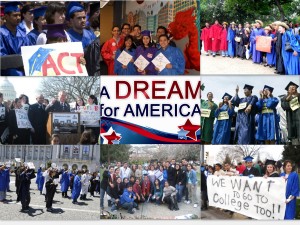Despite the arrival of another year without a pathway for citizenship for undocumented students in the United States, activists continue to rally.
During the week of February 22, supporters of the DREAM Act — a proposed federal bill that could assist more than 65,000 students who arrived in the United States as children to obtain a pathway to legal residency — will host the DREAM Action Week.
The DREAM Act, which has been in limbo in Congress since 2007 although similar bills have been proposed since 2001, is an acronym for the Development, Relief and Education for Alien Minors Act. If passed by Congress and signed into law by President Barack Obama, undocumented students who arrived to the U.S. before the age of 16 would be granted “conditional permanent residency.” Though the proposed federal bill remains at a halt, state lawmakers have considered passing other legislation that would assist undocumented youth like in Florida and Tennessee.
Regardless of stalled efforts at legislative levels, groups like DREAM Activist and the United We Dream Network are inviting supporters to take part in free online trainings – “webinars” – to promote the cause of “just and humane immigration reform” in the U.S. Four trainings are on offer: basic guide, recruitment of supporters, legislative analysis and accessing local media.
Utilizing the power of the Internet and citizen media again, DREAM activists are spreading the word of Action Week via different social media outlets. Bloggers of Immigrants in USA have re-posted the information, while hundreds of Tweeps are tweeting about it.
A South Korean-American blogs on the website of Asian Pacific Americans for Progress about the importance of the DREAM Act despite the challenges and asks for fellow undocumented students to not be “silent or ashamed.” She also writes that the issue isn't limited to Latinos but Asian Americans too.
Today, I have a 3.8 GPA while I actively involve in a community. I work hard and push myself to show that anything is possible in this country, despite my undocumented status. And I will continue to push myself to be a role model to other people, especially in the Asian American community.
There are thousands of Asian-American undocumented students who are struggling to live a normal life just like me. Clearly, immigration is not only a Latino issue; it impacts everyone.
And to further keep the momentum despite the nearly nine years of static, Kemi Bello writes on Change.org, that one of the oldest student organizations, United States Student Association, passed a resolution in support of immigration reform and the DREAM Act a top priority in 2010.
The USSA's Board of Directors is composed entirely of college students from across the country, and the organization has an active presence on over 400 college campuses. And this broad coalition of students chose to make the DREAM Act, along with Student Aid Reform, one of its key legislative priorities for 2009 and 2010. It's recent decision to support CIR ASAP stems in large part from the fact that the legislation includes a DREAM Act provision to address the plight of undocumented youth brought to the U.S. at a young age.
But Bello notes in her blog that activism isn't limited to undocumented students but everyone.
The student voice — whether that of an undocumented student, citizen student, LGBT student, student of color, minority student, or veteran student — is awakening in America.







